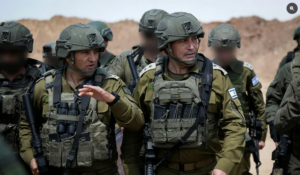Amid rising anti-war protests, IDF to cut reserves, bolster combat zones with conscripts

IDF Chief of Staff Eyal Zamir with commander of the Southern Command, Yaniv Asur, in Shujaiyeh, Gaza, on 15 April 2025
Yaniv Kubovich and Bar Peleg report in Haaretz on 16 April 2025:
Due to the hundreds of reservists who have been protesting to end the war in Gaza, the army has decided to reduce the presence of reservists in areas of active combat and to reduce the number of call-up notices it sends reservists.
Officers argue that the reservists’ lack of faith in the army’s current mission could undermine the implementation of its war plans at a time when it’s already facing challenges implementing these plans in the Gaza Strip, Lebanon, Syria and the West Bank.
To reduce its dependence on reservists, many of whom are finding it difficult to report for duty for a variety of reasons unrelated to the protest movement, the Israel Defense Forces is sending more units from the conscript army to the Gaza Strip.
Sources in the army say that the decision of IDF Chief of Staff Eyal Zamir’s to suspend air force reservists who signed a letter protesting the war from active duty has had the opposite effect of what he had hoped for. This decision, which was also approved by air force commander Tomer Bar, was disproportionate, they said, and neither man expected the ensuing crisis, which has worsened from day to day as a growing number of reservists sign similar letters.
Since Zamir now realizes that he has to do damage control, and representatives of the air force signatories will apparently be invited to meet with him and Bar for a second time in an effort to find a solution. He is also expected to invite reservists from other units to express their concerns.
Army sources said the decision to oust the air force reservists was made under pressure from the government, albeit indirect. They also said the crisis in the reserves has grown far beyond what the public is aware of. According to senior army officers, the potentially severe ramifications of this crisis must be presented to Prime Minister Benjamin Netanyahu and the security cabinet as soon as possible.
When Zamir decided to oust the air force reservists, he said that they are an inseparable part of the force both in ordinary times and times of crisis and should therefore be treated like career army personnel. But now, senior IDF officers understand that after 18 months of fighting, the reservists feel a need to speak out. They also seek to disentangle their civilian lives from their military ones rather than having the army’s demands dominate their lives.
On Tuesday, hundreds of former special forces soldiers, some of them active reservists, have also published a letter calling for the release of the hostages – even at the cost of halting the fighting. In their statement, they wrote: “Bringing the hostages home is the most important moral imperative today, and it takes precedence over any other goal or value.” They added that “The fact that soldiers and civilians have been held captive in Gaza for 556 days undermines the moral foundations of the state, the principle of mutual responsibility, and the military values on which we were raised and continue to uphold.”
The letter was signed by 472 veterans of elite special operations units, including Shaldag, Moran (Unit 214) and Unit 669.
Over the next few days, senior officers plan to hold talks with field commanders on how to deal with the reservists’ problems.
Roughly 20 percent of the thousands of people who have signed letters in support of the air force reservists have been doing reserve duty since the war began, while many others serve in vital roles. Consequently, the number of signatories worries the IDF.
The initiators of the air force reservists’ letter that called for an end to the war in Gaza, at a press conference, last week.Credit: Moti Milrod
Nevertheless, Zamir reiterated his opposition to the protest letters on Tuesday. “The IDF will continue to act in a statesmanlike manner and won’t let divisions penetrate its ranks,” he said. “Reservists have a right to express their opinions in a democratic manner on any issue as civilians, when they aren’t on active reserve duty. But the attempt to drag the IDF into this and to speak as a group in the name of any military unit is unacceptable, and we won’t permit it.”
A few hours before he made those remarks, dozens of veterans of the naval commando unit, Shayetet 13, issued a statement calling for a deal to bring the hostages home even at the price of ending the war. According to the organizers, 69 of the 254 signatories are in active reserve duty.
In recent days, similar statements have been issued by veterans of the army’s cyber warfare unit, the special operations unit, intelligence unit 8200, the armored corps, the Talpiot technology unit, other elite units and more. Additionally, an open letter calling for ending the war and a deal to free the hostages was released Tuesday morning by 3,000 health-care professionals and Nobel Prize laureates. Similar letters were released in previous days by academics, educators and authors.
This article is reproduced in its entirety
